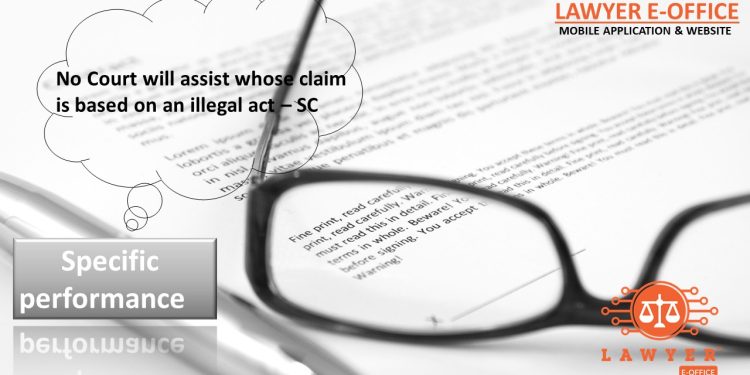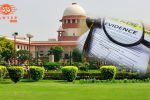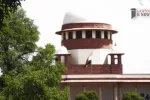No Court will assist whose claim is based on an illegal act – SC

D.D- JANUARY 18, 2022.
Supreme Court observed in recent Judgement (18th Jan 2022) that the principle that the Courts will refuse to enforce an illegal agreement at the instance of a person who is himself a party to an illegality or fraud is expressed in the maxim in pari deucto portior est conditio defendentis.
The appellants defendant in a Suit filed for specific performance – Trial Court while refusing specific performance, directed the return of the amount paid by the plaintiff under the contract – High Court allowed the plaintiffs appeal and directed the appellants to execute the sale deed relating to the plaint schedule property in favour of the plaintiffs (legal representatives of original plaintiff).
Facts – On 04.04.1979 a site, was allotted to the first defendant by the Bangalore Development Authority (BDA) – a lease-cum-sale agreement was entered into between the BDA and the first defendant on 04.04.1979 -put in possession on 14.05.1979 – On 17.11.1982, the first defendant entered into the agreement with the plaintiff agreeing to execute the sale deed within three months from the date on which obtained the sale deed from the BDA – on 26.04.1984 the plaintiff issued letters to execute the sale deed – defendant agreement had lapsed and the advance forfeited – plaintiff issuing Notice on 14.02.1985 and instituted the Suit for specific performance – during pendency defendant died and her husband implead as defendant 1 (a) and her son defendant 1 (b) – sale deed executed by the BDA in favour of the son of defendant and defendant 1 (a) on 19.06.1996 – defendant 1 (b) execute sale deed in favour of Defendant No.2- Trial Court directed to return of Rs.50,000/- with 9 per cent interest – Appeal to High Court – Set aside and ordered jointly convey the property to the plaintiff – aggrieved defendants filed appeal to Supreme Court.
Supreme Court further observed that what one has to see is whether the illegality goes so much to the root of the matter that the plaintiff cannot bring his action without relying upon the illegal transaction into which he had entered. This Court further held, that if the illegality is trivial or venial and the plaintiff is not required to rest his case upon that illegality, then public policy demands that the defendant should not be allowed to take advantage of the position.
Further observed that undisputedly, both, the predecessor in-title of the defendant(s) as well as the plaintiff, are confederates in this illegality. Both, the plaintiff and the predecessor-in-title of the defendant(s) can be said to be equally responsible for violation of law. If the decree is granted in favour of the plaintiff on the basis of an illegal agreement which is hit by a statute, it will be rendering an active assistance of the court in enforcing an agreement which is contrary to law. As against this, if the balance is tilted towards the defendants, no doubt that they would stand benefited even in spite of their predecessor-in-title committing an illegality. However, what the court would be doing is only rendering an assistance which is purely of a passive character. the first course would be clearly and patently inconsistent with the public interest whereas, the latter course is lesser injurious to public interest than the former.”
Apex court held that no Court will lend its aid to a man who founds his cause of action upon an immoral or an illegal act.
Decree for Specific performance dismissed .
G.T. GIRISH
VERSUS
SUBBA RAJU (D) BY LRs AND ANOTHER






